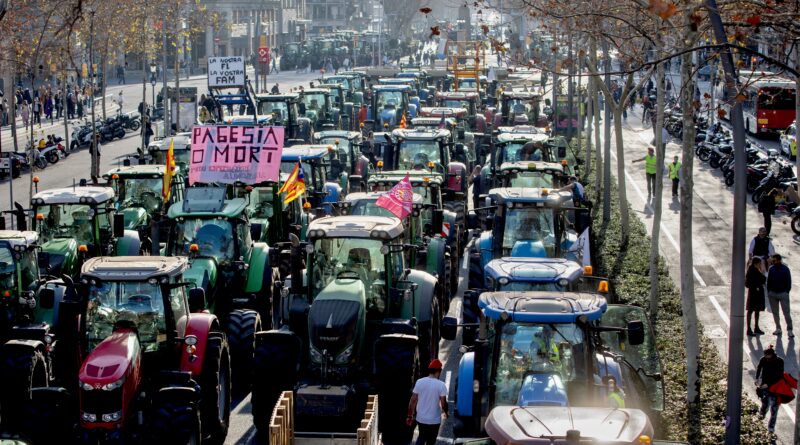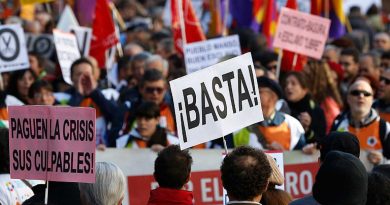Agrarian protests: from the EU to the Spanish State
The claims cross the European Union. The sector has actors with disparate realities and interests. Requires a principled and independent policy, of an emergency response that is accompanied by a bottom exit.
By Rubén Tzanoff and Gérard Florenson
Different agricultural sectors have protested in France, Netherlands, Portugal and other countries, issue that for governments constitutes a major problem since in the EU there are more than 10 millions of primary farms that occupy 150 million hectares. Now the protests have spread to the Spanish State, mainly due to the initiative of small farmers and ranchers who convened themselves through social networks such as WhatsApp and Telegram; which is different from the protests of 2020, when the dynamics were imposed by traditional landowner organizations.
Strong actions
The actions have been felt in Madrid, Barcelona and many other cities and it has been announced that they will continue during February. in Catalonia, where the agrarian situation is particularly aggravated by the drought, more of 2.000 tractors advanced from Lleida, Tarragona and the center of the territory towards Barcelona that was collapsed. They were received by the President Pere Aragonés and the PSC parliamentary blocs, ERC, together, CUP, In Common We Can and Cs. In this Autonomous Community, The claim has popular sympathy and is expressed in terms similar to those raised by the CUP: "Long live the struggle of the peasantry and long live the land". In the State, the actions in Ávila are repeated, Huesca, Ciudad Real and Salamanca, among other, appealing to the support of neighbors. The concern is so great that Pedro Sánchez promised to find solutions, with one eye on the claims and another pointing to the next elections in Galicia, Autonomous Community where the agricultural sector has a determining weight.
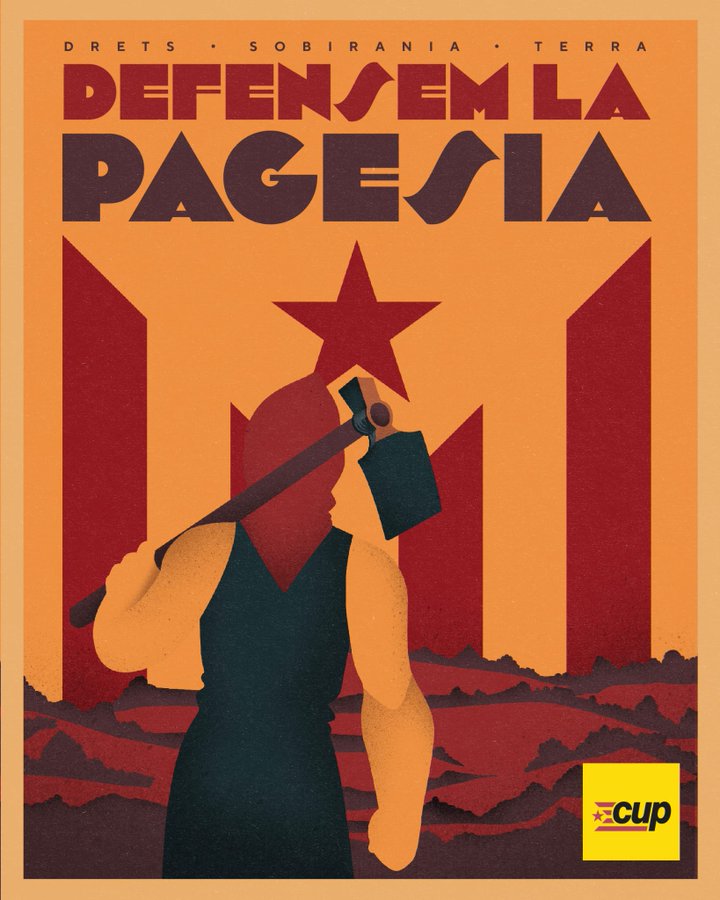
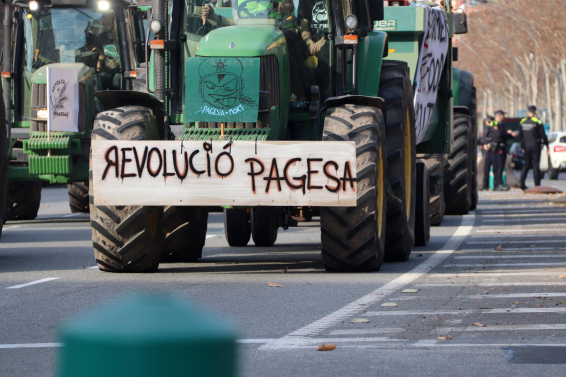
Alarm in the food and transport majors
So that your millionaire profits are not affected, The large food and transportation business chains demanded that the protesters not paralyze “the free movement of goods and people” and to the Ministry of the Interior to guarantee it. Governments of different countries fear that blockades will cause the paralysis of all economic activities, since they largely depend on road transport and the demonstrations extend to other professions, following the model of the “yellow vests” french.
The claims
The protests demand changes in policy for the sector, less bureaucracy, lower environmental requirements with fertilizers and control unfair competition from non-EU countries. from now, it is impossible to share the orders that, for example, They are moving in the direction of rejecting environmental protection measures and confronting farmers from other countries.. But this reality cannot hide that the sector is going through a critical situation.. Distancing ourselves from reactionary responses to this dismay does not mean incriminating farmers who are in a bind and believe they cannot get out of it if agri-environmental regulations cause a drop in production and an increase in unpaid work. 1 . The contradictions of the common agricultural policy are also responsible for the dispute, for example, Hedges have been removed to facilitate the passage of increasingly larger agricultural machines and now they must be replanted to protect biodiversity, in both cases under penalty of financial sanctions.
Great inequalities
In Spain the vast majority of farms are family farms (96,3%), I mean, small and medium enterprises, being the second country in the EU in terms of area dedicated to agriculture and an approximate occupation of 740.000 people. At the same time, a small number of large farms occupy a large amount of land. As in the rest of Europe, direct agricultural labor is decreasing while the number of employees in agri-food companies has increased.
Small agricultural producers or cooperatives are victims of banks and their loans under unfavorable conditions.. Also from the multinational distribution and marketing companies that impose low sales prices to obtain large profits at the end of the production chain.. Those who really define prices are Mercadona, Carrefour, Day, buy it, Lidl and Auchan, whose increases harm both small producers and consumers. EU authorities and the government are at the top of the responsibilities, as, in the face of the crisis of the capitalist economy, They allocate million-dollar resources to those who need them least, to large landowners and industrial groups such as Danone, Nestlé or Unilever that demand increasingly cheaper agricultural products to incorporate into their "junk food". For this they need egg factories, milk and meat, without worrying about animal welfare and even less about the welfare of workers. Y, as usual, The most affected are rural workers and day laborers, mainly immigrants. In many cases they are forced to be employed illegally, with temporary contracts and/or in conditions of semi-slavery in exchange for miserable salaries. In summary, The big capitalists appropriate the fruit of other people's labor with total “normality”.
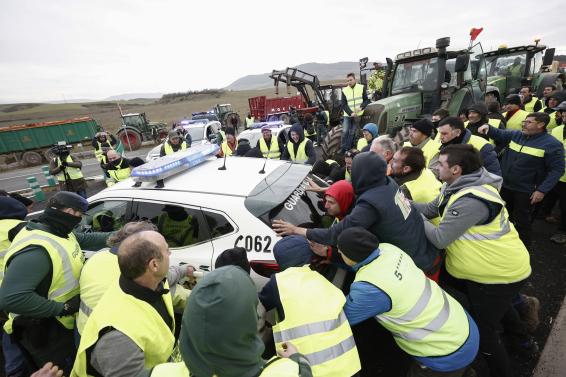
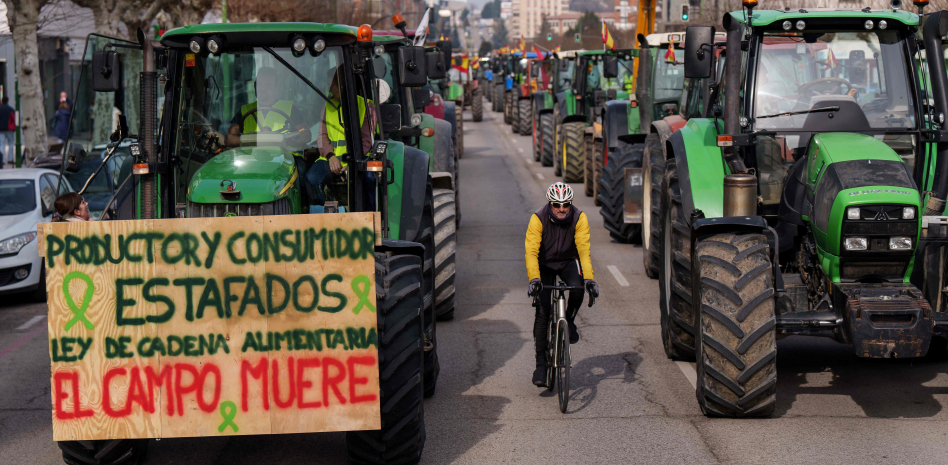
The right and the extreme right on the prowl
It is a fact that the right of the PP and the extreme right of Vox are actively fighting to control and capitalize on the unrest, like the Valencian rancher Lola Guzmán, Vox supporter, who uses one of the most common slogans of reactionary sectors “We are neither left nor right”. There is a dispute since many calls came from outside the large traditional Associations and unions. We must not endorse that the right and the extreme right confront the peasants of both countries. The same speech is heard on both sides of the Franco-Spanish border.: “foreign competition is unfair, "It does not respect social rights or environmental standards.". The French denounce Spanish wine and fruit growers (2) and these in turn do the same with the citrus producers of the southern countries (3) .The path does not even pass through that confrontation, nor for exploiting workers more and polluting unscrupulously with the pretext of being more competitive than their neighbors. (4)
A principled policy
Not everything that moves, even radically, is a guarantee of a progressive character, although the anger is justified. In the case of farmers, there are enormous income disparities and it is also necessary to distinguish family businesses from those that employ permanent or seasonal employees.. Without forgetting the agricultural workers, those who are employed in agri-food industries and companies, nor to those who plant and harvest extensive crops. Full rights for workers throughout the food chain!
It is necessary to offer answers only to those who are neither exploiters nor rich, granting cheap loans, affordable prices for agricultural machinery and fertilizers, transport conditions, sale of favorable products and measures that do not destructively affect nature. The farmers, who face the complexity of declarations and aid applications and fear financial penalties in case of error, They must benefit from free support from a public agricultural service endowed with sufficient resources to fulfill this mission. Y, fundamentally, undertake a process of agrarian reform, with the nationalization without compensation of landowners and large landowners, moving towards an agroecological model without transgenics or agrotoxics, with the start of production democratically decided and controlled by the workers. The same must be done throughout the production chain, distribution and marketing, so that the circuit is “from the field to the plate” and thus move towards food sovereignty. The independent mobilization of small producers who are not exploiters together with the workers and the population is needed.. These emergency measures have to be transitional towards other fundamental ones since the banks, The big monopolies and businessmen will continue trying to make profits at the expense of workers and peasants.. The European Union, the governments, the reformists, the right and the extreme right cannot offer truly progressive measures because they remain within the margins of capitalism, an unfair and unequal system that is incapable of resolving the contradictions between the city and the countryside. The fundamental solution is through the unity of small farmers and the working class, the expropriation of looters and the implementation of a democratically planned economy, that can only occur within the framework of a socialist system.
Notes :
(1)Nor can we blame families with increasingly lower incomes who buy the cheapest products instead of organic and local products.
(2) The statements of the former minister “socialist” Ségolène Royal against the bad taste of Spanish organic tomatoes and, in general, of falsely organic Spanish production, They could be a source of laughter if the “left” did not support an unfortunately widespread xenophobic discourse.. Regarding his denunciation of the working conditions of day laborers in Spain, It must be reminded that they are no better in many sectors of French agriculture where many immigrants are exploited
(3) Wheat producers who complain about competition from Ukraine seem unaware that many of the country's large privatized farms are now controlled by agricultural companies based in different countries., including France. These companies import machines, fertilizers and phytosanitary products for the greater benefit of manufacturers. In several African countries, the cultivated land is in the hands of European owners who exploit the local labor force and export the production to rich countries. The sale of Moroccan vegetables does not benefit the local population. Large grain producers in the United States have flooded Mexico with genetically modified corn at bargain prices and have caused the ruin of thousands of Mexican farmers.. The list would be long of this “unfair competition” that is not unidirectional..
(4) On the one hand, European governments resume protectionism so as not to leave this terrain to the extreme right., knowing that the idea of controlling imports to protect national production finds a favorable response among farmers, on the other hand, They participate in liberal globalization from which they expect benefits for large industrial and service companies..

